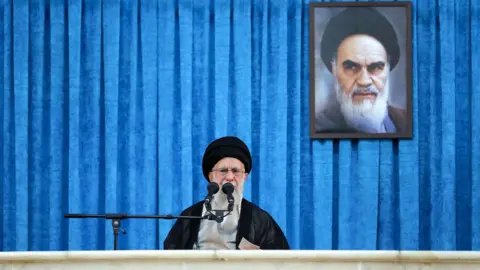Iran’s Supreme Leader Ayatollah Ali Khamenei has publicly expressed significant criticism of a recent nuclear deal proposal from the United States, suggesting that the plan is fundamentally flawed and unlikely to halt Iran’s uranium enrichment program. This criticism was articulated during a speech marking the anniversary of the death of Ayatollah Ruhollah Khomeini, the founder of the Islamic Republic of Iran. In Khamenei’s view, the proposed agreement would undermine Iran’s sovereignty and contradict the nation’s commitment to pursue its nuclear development as it sees fit.
Reports indicate that the U.S. proposal aims to halt Iran’s production of enriched uranium, a material crucial for both nuclear power generation and the potential creation of nuclear weapons. Instead, the plan suggests that Iran would rely on a regional consortium for its uranium supply. Khamenei’s response was emphatic; he cited the emblematic slogan of Khomeini, stating he is “100% against the idea of ‘We can,'” thereby rejecting the idea that Iran would yield to external pressure on its nuclear policies.
As the negotiations progress, Iranian officials, including Foreign Minister Abbas Araghchi, are expected to respond formally to the U.S. plan. Araghchi has expressed the view that Iran has made substantial sacrifices to develop its nuclear capabilities and is not prepared to abandon them. He stated unequivocally, “No enrichment, no deal,” emphasizing the importance of maintaining Iran’s progress despite external assertions to the contrary.
The backdrop to this latest round of negotiations is marked by a persistent tension that has characterized U.S.-Iran relations since the Trump administration unilaterally withdrew from the 2015 nuclear deal. This agreement had previously established mutual commitments, wherein Iran agreed to limit its nuclear activities in exchange for the lifting of economic sanctions. President Donald Trump’s administration reinstated these sanctions, arguing that the deal was inadequate in curtailing Iran’s potential for military nuclear development.
Recent statements from Trump highlight the urgency he perceives in Iran’s decision-making process regarding its nuclear ambitions. He has reportedly conveyed to Iranian leaders that they need to reach a conclusive decision swiftly, while also warning of the potential for military action should diplomatic negotiations deteriorate. Trump’s demand for halting all uranium enrichment before any deal is finalized underscores a hardline stance that complicates prospects for a renewed agreement.
Khamenei’s insistence on the continued enrichment of uranium is indicative of Iran’s broader strategy of leveraging its nuclear program as a means of asserting its geopolitical standing. He articulated that “Uranium enrichment is the key to our nuclear programme and the enemies have focused on the enrichment,” signalling Iran’s commitment to defending its narrative of peaceful nuclear development against perceived Western aggression.
Moreover, revelations from the International Atomic Energy Agency (IAEA) disclosed that Iran has accumulated a stockpile of uranium enriched to 60% purity, which is perilously close to weapons-grade material. This development has heightened international concerns regarding Iran’s intentions and the overall safety of regional stability.
In this complex interplay of diplomacy, Khamenei maintains that Iran’s nuclear program is for peaceful purposes and should not be hindered by foreign powers. He challenged U.S. demands, stating, “Who are you to decide whether Iran should have enrichment?” Such rhetoric resonates strongly in the context of national pride and defiance against the backdrop of historical Western interventions.
As discussions continue, the stakes remain high for both Iran and the United States. The outcome could redefine the landscape of international relations surrounding nuclear non-proliferation in the Middle East, underscoring the pressing need for diplomacy to harness a peaceful resolution while ensuring security for all parties involved. In the days ahead, further negotiations are anticipated, which will test not only Iran’s resolve but also the efficacy of U.S. diplomatic strategies in addressing one of the most challenging security dilemmas of our time.



